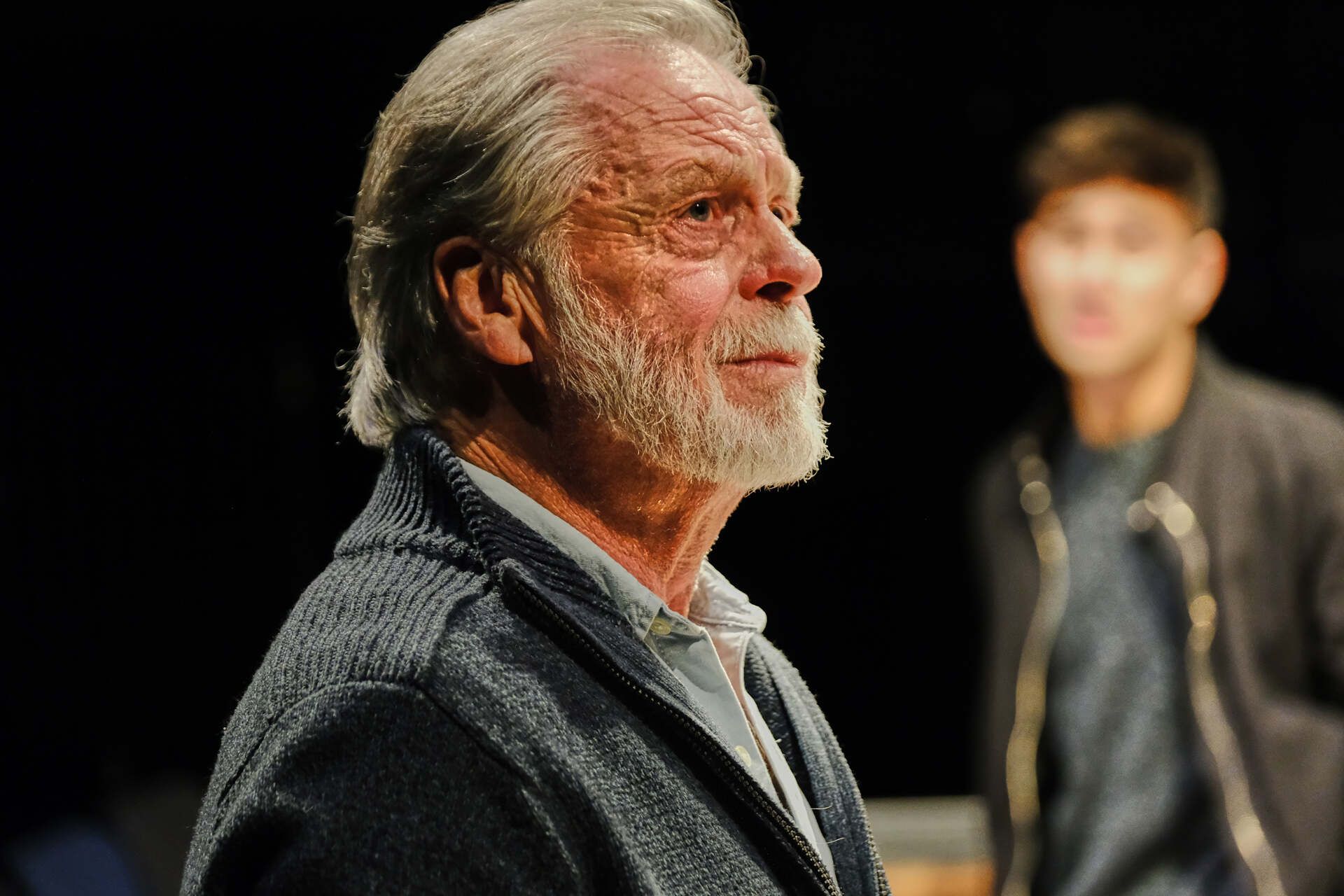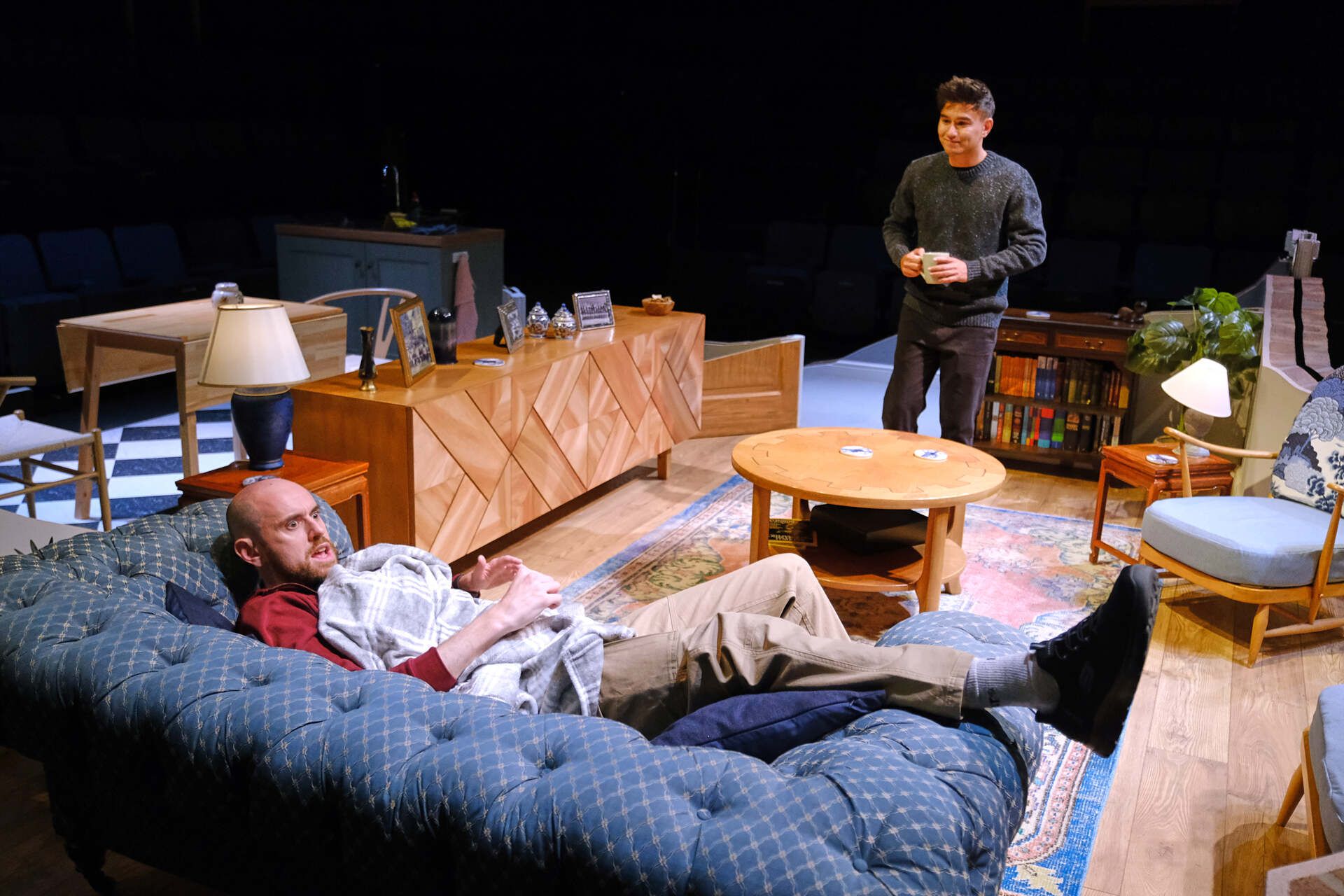- Northern Theatre News
- Pages
- Earth Angel - A Northern Theatre News Review
Earth Angel - A Northern Theatre News Review
I was gutted when I couldn’t attend the Press Night of Alan Ayckbourn’s latest play last week as I had a pesky diary clash, but my solution was simple…
I just went back this week instead!
And very glad I made the journey back to Scarborough, even though my favourite chippy had the audacity to be closed, this was definitely worth the trip.
 Best chippy in Scarborough and it’s unfortunately shut ;-( |  Decent alternative found, not sure about the name though. |
Ayckbourn’s Earth Angel begins after the death of our titular character, specifically the clearing up of the buffet after the wake - which feels suitably Ayckbournian (and if that’s not a word, it should be!).
The story’s central character is Gerald Mallett, the husband of Amy, his Earth Angel, but we have some setup before we get to him.
 | So, we start with Norah, a busy body neighbour, and Daniel an enigmatic guest at the funeral who has stuck around to help. Norah’s conversation with Daniel as they dry the dishes (real water in the sink!) gives us an insight into Amy, her illness, untimely passing and her relationship with Gerald. All the while there is a quiet, very middle class, awkwardness as Norah tries to nudge Daniel into revealing who he is and why he’s here - a task she fails miserably at. |
But. despite Norah’s obvious concerns, Gerald is willing to accept that Daniel is just someone trying to be helpful, supportive, even if Gerald too doesn’t know who he is either.
He’s also preferable to Norah’s fussing - to Gerald at least.
This basic setup propels the rest of the narrative, who is Daniel, why did he come, and what does he want?
In addition to the characters already mentioned we have Maxine - Gerald’s Sister, Adrian - Maxine’s Husband who’s an ex-copper, and Hugo - a tech obsessed local that Norah ropes in to ‘help’.
Everyone, except Gerald, is convinced that Daniel is some kind of threat, with dark ulterior motives - which he denies.
And of course, as this is Ayckbourn, things soon spiral out of control.
Out of the gate I want to give mention to the staging and set design, as they are both inventive and minimalist. Inventive in the way that the shape of the house exists, walls, doors, even moss at the base of the external walls - but minimalist as it is all done as a cutaway. So the walls come up like five or six bricks high, the doors the same, like someone has sliced through the structure of the house so that we can experience it as a house but see through the normal barriers to the drama within. All played out in the round and very well realised.

Thematically the play deals with a number of all too relevant contemporary themes, some it handles better than others, but Ayckbourn’s ambitions are evident with the number and way he tackles them.
In our overtly suspicious and cynical age, where the internet normalises mask wearing, we are asked to consider goodness. Whether someone, in this case Daniel, can just be what they say, a good person who wants to help.
I’m not entirely sure we get a satisfying conclusion to this (no spoilers!) but maybe the ambiguity of the ending is the truth, even if it’s not the conclusion we wanted as an audience or guessed at.
 Russell Richardson - exceptional! |  Iskander Eaton - exciting new talent |
Grief also looms large, with the obviousness of the setting post-funeral and Gerald’s reaction to his loss. But within this Gerald’s grief is not stereotyped, exemplified by a fascinating sequence when he asks why he, the living, is not more centre of attention at the funeral. His loss isn’t all consuming, but the loneliness he fears may become so. Which is why Daniel’s presence, a stranger to all, doesn’t feel as outlandish as it might in other circumstances.
In Hugo we have our third theme made flesh, social media/online fear and paranoia, the characters first thought is to look Daniel up online (though without a surname I’m not sure how he achieves that!). Ayckbourn has said that he feels that if Jesus came back today the world, including Christians, would be suspicious and online chatter would be too full of conspiracy theories to recognise him.

The in the round setting works perfectly
This isn’t an area Ayckbourn has touched on head-on before, and here it feels cautionary but at the same time it still has the air of the polite, as lensed through middle-class concerns and expectations - this is not the online world of Adolescence. For the audience we saw it with at Stephen Joseph Theatre this feels intentional, like a primer for the harsher reality of the online world younger generations exist with.
And of course, this is all seen through Ayckbourn’s ambiguous viewpoint. So we are not given clear or simple answers, and even the denouement defies expectations - well mine at least!
All in all this is further evidence of why Ayckbourn remains one of the UK’s leading dramatic voices even after some 90 odd plays!
*all production photos are from Tony Bartholomew for SJT
Cast and Creative team
Elizabeth Boag - Norah
Iskandar Eaton - Daniel
Stuart Fox - Adrian
Liza Goddard - Maxine
Russell Richardson - Gerald
Hayden Wood - Hugo
Writer and director: Alan Ayckbourn
Designer: Kevin Jenkins
Lighting Designer: Jason Taylor
Associate Sound Designer: Ernest Acquah
Wardrobe Supervisor: Julia Perry-Mook
Scenic Artist: Julia Wray
Casting Director: Sarah Hughes CDG
Deputy Stage Manager: Sue Volans
Assistant Stage Manager: Anna Reid